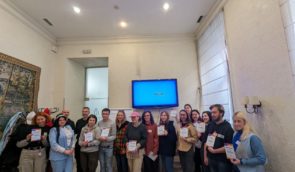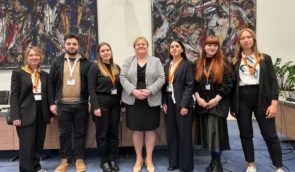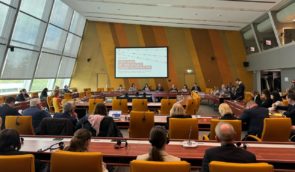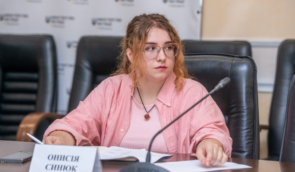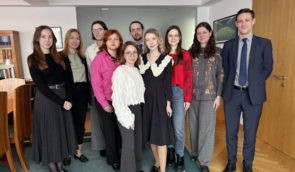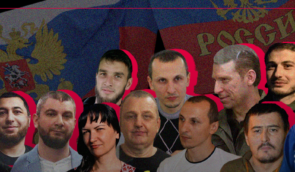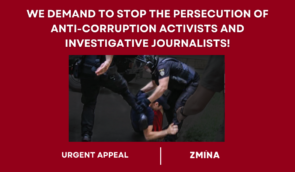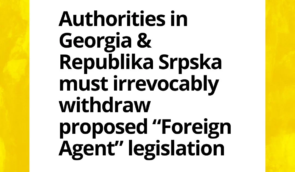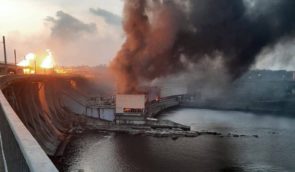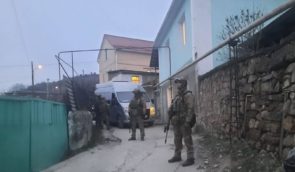10 years of resistance to the occupation of Crimea: ZMINA held advocacy events in Brussels
On February 26, on the Day of Resistance to Russian Occupation of Crimea, ZMINA together with three other participating organisations of the Human Rights House Crimea held a series of events and meetings in Brussels to remind the international and the Ukrainian community about the decade of Russian occupation of Crimea and the decade of resistance.
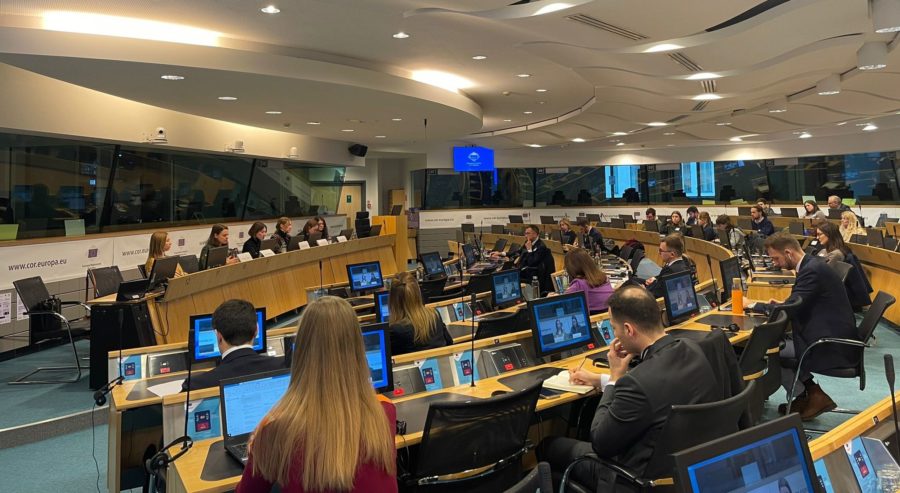
In particular, organisations in cooperation with the Mission of Ukraine to the European Union and CrimeaSOS held the event “10 years of resistance. Violation of human rights and international humanitarian law in temporarily occupied Crimea” with the support of Ukraine 5 AM Coalition. The event took place in the European Committee of the Regions and gathered representatives of European institutions and foreign countries.
The event was opened by Emine Dzhaparova, the Deputy Minister of Foreign Affairs of Ukraine: “Russia systematically and grossly violates the norms of international humanitarian law regarding Ukrainian prisoners of war and civilians, including children. It commits war crimes, crimes against humanity and the crime of genocide”.
Dzhaparova added that she is afraid to “recognize another familiar name in the list of victims of Russia” and recalled the recent arrests of her friends – a human rights defender and a journalist Lutfiie Zudiieva and a lawyer of political prisoners Emil Kuberdinov.
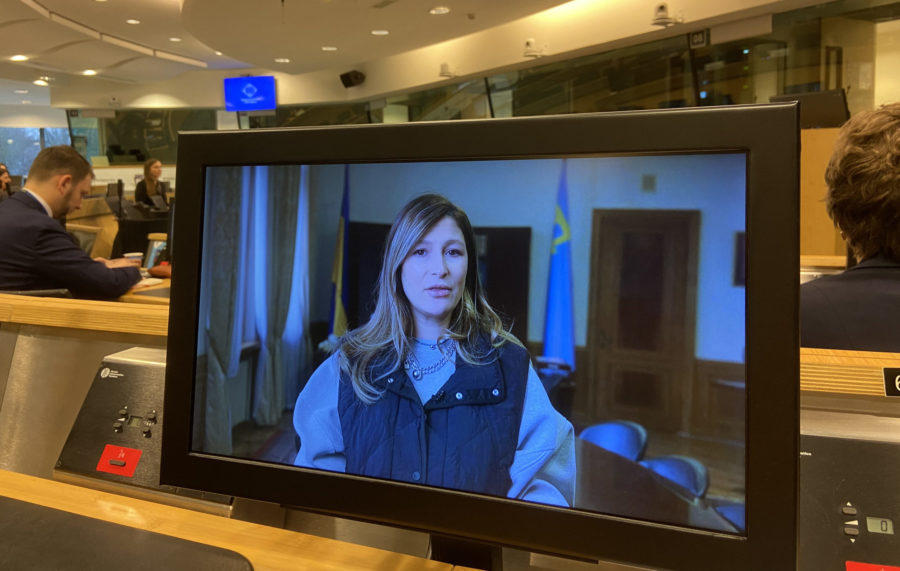 Photo: Emine Dzhaparova
Photo: Emine DzhaparovaThe deputy representative of the President of Ukraine in Crimea, Olha Kuryshko, noted that since 2014, Crimea has turned into a “playground”, from there crimes are subsequently “copied, multiplied and used” in the newly occupied territories.
“These practices include human rights violations, abduction, torture, illegal detention, murder of activists and deportation of Ukrainian children”, Kuryshko said.
Ambassador of Ukraine to the European Union Vsevolod Chentsov emphasised that “this lesson must be learned” not only in order to “understand the truth about the occupation of Crimea”, but also in order to “understand how to deal with Russia”.
MEP Anna Fotyha, who is also the mentor of political prisoner Server Mustafaiev, said that her vision for the entire period since 2014 includes “a long list of our mistakes”.
“We must be consistent and principled in order to counter such violations. With more cooperation and decisive measures from the international community, we would have avoided many of these atrocities”, Anna Fotyha emphasised.
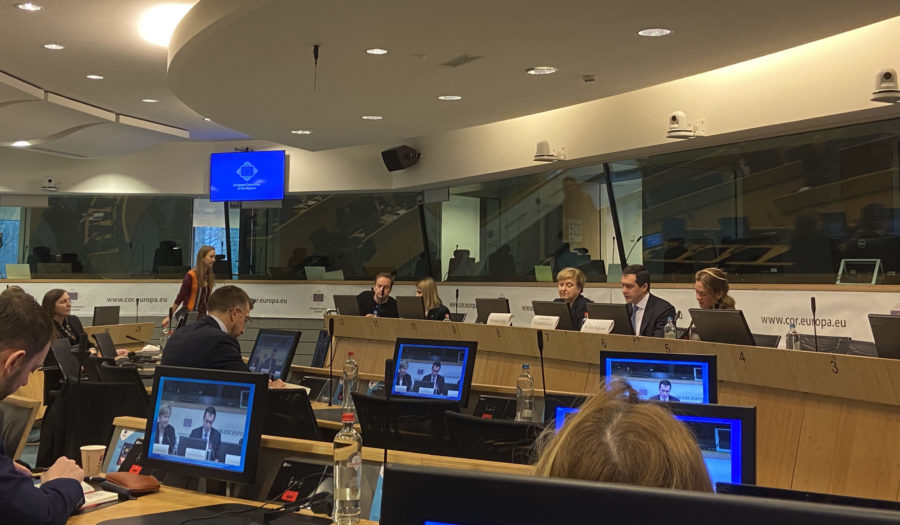
After the opening remarks, the participants of the event watched a video from Ukraїner about 10 years of resistance and proceeded to the discussion. It was about human rights violations in the territory of the temporarily occupied peninsula.
In particular, Tetiana Zhukova, the international advocacy officer at Human Rights Centre ZMINA, spoke about the lack of freedom of speech and the persecution of journalists. Only in the first year of occupation, 88% of Crimean media were closed, and access to mainland Ukrainian publications was blocked.
“Independent journalists became the target of intimidation by the occupying “authorities”. ZMINA recorded 162 cases of persecution of journalists and bloggers in 2022-2023. In addition, at least 15 Crimean journalists are currently imprisoned for political reasons – most of them were illegally transferred to the territory of the Russian Federation, and they are kept in inhumane conditions and are not provided with medical care, Zhukova noted. – For example, Nariman Dzhelial was transferred to Krasnoyarsk Krai – more than 5,000 km from his home; Amet Suleimanov has heart problems and needs urgent surgery; Iryna Danylovych lost hearing in her left ear in prison”.
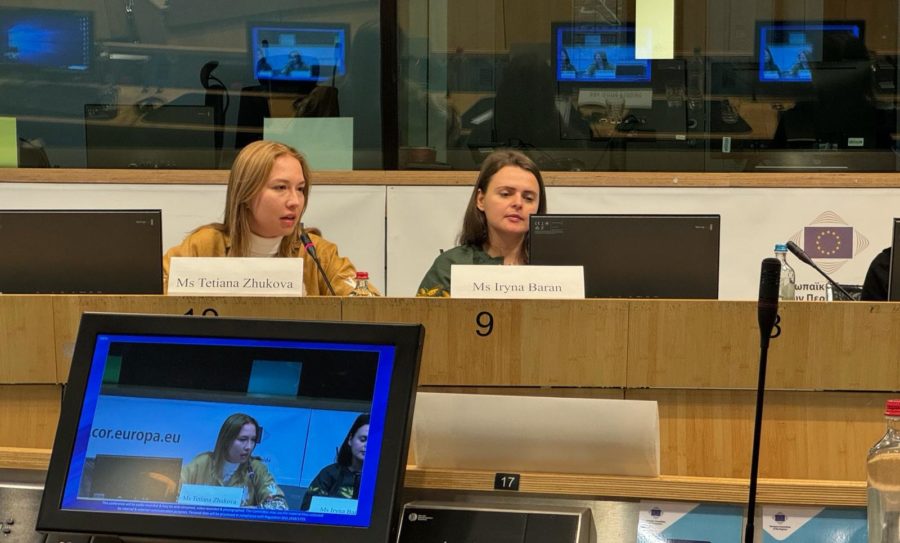 Photo: Tetiana Zhukova and Iryna Baran
Photo: Tetiana Zhukova and Iryna BaranIryna Baran from the Crimean Human Rights Group added that two Crimean political prisoners – Kostiantyn Shyrinh and Dzhemil Hafarov – died due to the lack of medical care.
She also noted the scale of persecution on the peninsula since the beginning of the occupation: “We have documented 84 thousand so-called “court hearings” in political processes. More than 1.4 thousand victims of political and religious persecution were recorded. It is significant that on April 26, 2023, the “judge” of the “Kyiv district court” of Simferopol Valentyna Kamynina issued a decision on a fine of 30 thousand rubles for publishing the flag of Ukraine with the inscription “Peaceful Sky” on the social network Instagram”.
She added that currently at least 200 citizens of Ukraine from Crimea are imprisoned on fabricated politically motivated cases.
“Every three days in occupied Crimea, people are abducted and accused of collaborating with Ukrainian intelligence or the army. Every day one Crimean is detained for posts on social networks, Ukrainian songs or manicure in the colour of the Ukrainian flag. Every few hours, at least 140 civilian hostages and political prisoners are subjected to inhumane treatment in penitentiary institutions”, said Sabina Ilias from Crimea-SOS.
She emphasised that the Russian Federation continues repression against lawyers who defend victims of politically motivated persecution. In particular, on February 15, 2024, the occupiers detained a lawyer Emil Kurbedinov.
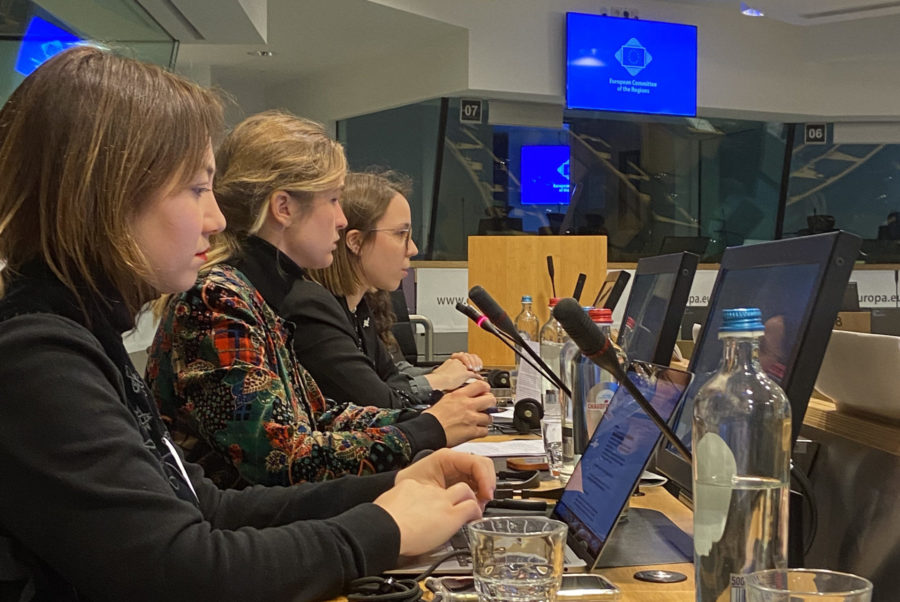 Photo: Sabina Ilias, Nlora Wehofsits and Daryna Pidhorna
Photo: Sabina Ilias, Nlora Wehofsits and Daryna PidhornaMariia Sulialina, a representative of the Centre of civil education “Almenda”, raised the topic of indoctrination of children: “503,965 children live in Crimea, of which 285,963 are of school age. The entire educational system from the first days of the occupation was transferred to Russian standards. If as of 2014, 100% of children studied the Ukrainian language in general secondary education institutions, then as of 2023-2024, only 1.2% of children study Ukrainian outside of school hours”.
Sulialina emphasised that the curriculum denies the existence of independent Ukraine, justifies the legitimacy of Russia’s armed aggression and creates a hostile image of Western countries. In addition, the number of cadet classes has increased: in 2016, there were 12 in Crimea, and by the beginning of the 2023 academic year there are already 191.
During the discussion, the topic of illegal appropriation of objects of cultural heritage of Ukraine, deliberate destruction of monuments and conducting illegal archaeological excavations was also raised.
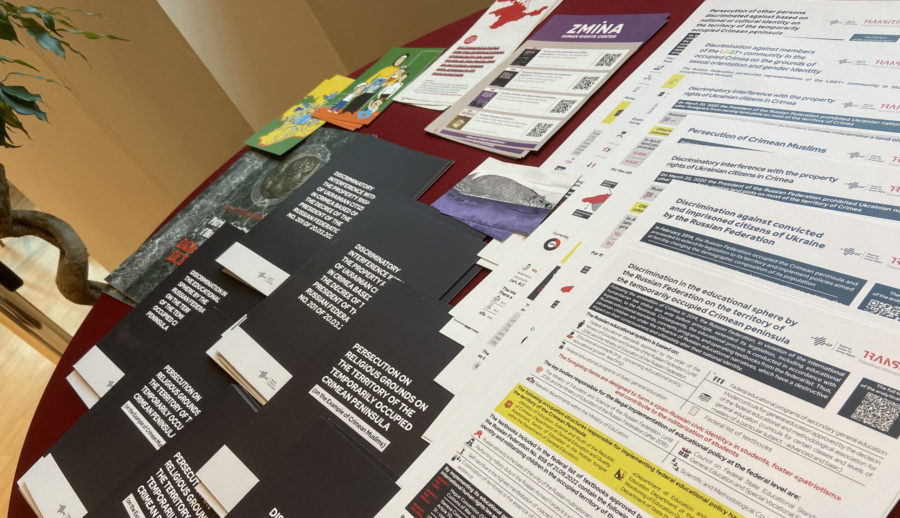
Daryna Pidhorna from the Regional Center for Human Rights said: “The Russian Federation appropriated 12,612 monuments of national and local importance, the property of 773 libraries, 26 museums, 5 historical and cultural reserves, where 1,247,360 museum objects were stored. In addition, many monuments were destroyed due to the construction of infrastructure – for example, during the construction of the Tavrida Highway and the Kerch bridge, more than 90 historical objects were demolished and more than 1 million artefacts were stolen”.
But despite the efforts of the occupying “authorities” to intimidate the inhabitants of the peninsula and erase their identity, Crimea continues to resist. The “Yellow Ribbon” and “Zla Mavka” movements operate in the occupied territory, as well as the “Crimean Combat Seagulls” and “Atesh”. Crimean Solidarity supports the victims of political repression.
It is also known about many individual cases of resistance: the Ukrainian artist Bohdan Ziza poured blue and yellow paint over the Yevpatoria city administration building, for which he was sentenced to 15 years in prison; Leniie Umerova, as a sign of her resistance, refused forced passporting and when she was crossing the border she was the only person on the bus with a Ukrainian passport, for this she was detained and now the girl faces up to 20 years in prison for “espionage”.
The experts urged listeners to take action such as: to support political prisoners and their families, as well as resistance initiatives and media from the occupied territories; to introduce sanctions; to create a mechanism for the release of Ukrainian civilians from Russian imprisonment and captivity; to write letters to a free Crimea; to provide Ukraine with weapons for the de-occupation of territories and ensure compliance with human rights standards and international law.
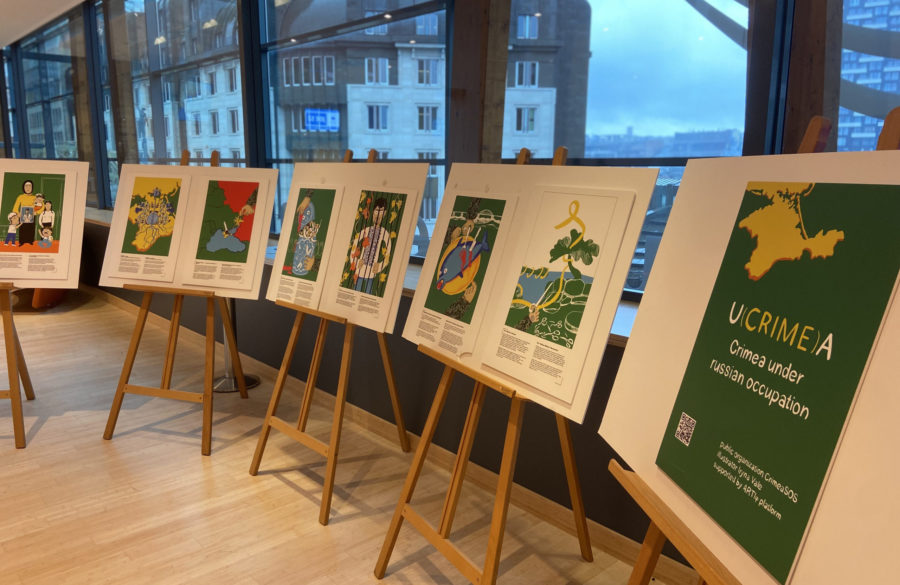
After the discussion, the participants proceeded to the inauguration of the exhibition U(Crime)A, created by CrimeaSOS with the support of the ARTIF platform to highlight crimes that took place on the peninsula from 2014 to the present.
In addition, participating organisations of the Human Rights House of Crimea, with the support of Ukrainian Voices RC, showed the film “Nariman: Voice of Crimea” about the journalist, activist and deputy chairman of the Mejlis of the Crimean Tatar people, Nariman Dzhelial. They also opened the exhibition “Stories from occupied Crimea” and held a discussion about the decade of occupation of Crimea with the Ukrainian community in Belgium.
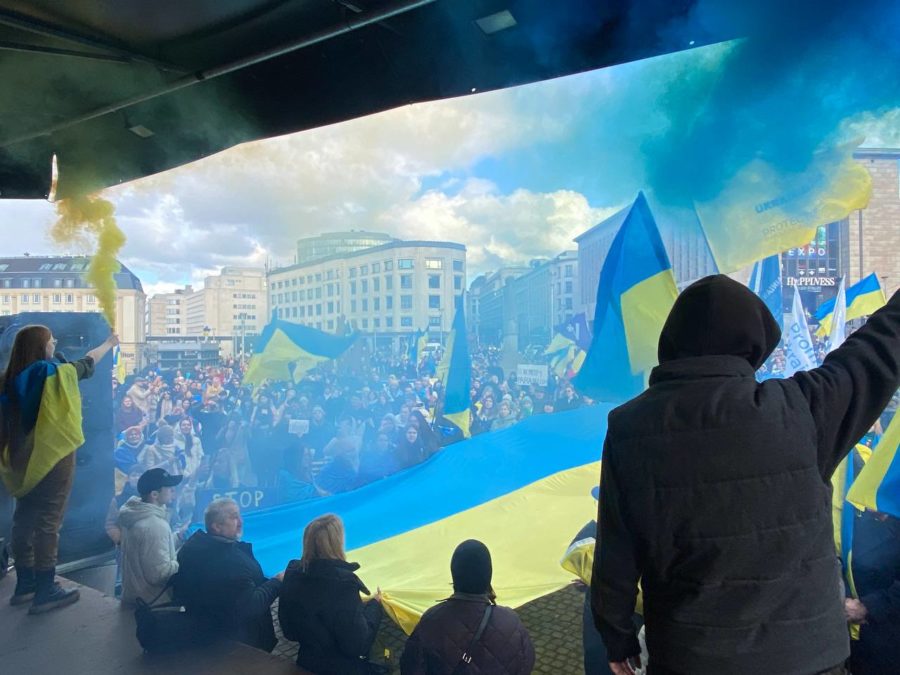
In addition, the representative of ZMINA joined the “Standing United in Support of Ukraine” solidarity march, which gathered about 7,000 people. It was organized by the Promote Ukraine and Ukrainian Voices RC organizations.
***
The trip of human rights defenders to Brussels was carried out in cooperation with the Regional Center for Human Rights with the financial support of the Ministry of Foreign Affairs of the Kingdom of the Netherlands.

